Meet Miguel Clement – Flying Start Trainee Odds On To Succeed
Miguel Clement is the 23-year old son of head trainer Christophe Clement, who trains Tonalist, the winner of the 2014 Belmont Stakes. During the summer meet at Saratoga I was lucky enough to spend some time with this engaging young man. To say Miguel is “beyond his years” would be an understatement. To say he was born with a “silver spoon in his mouth” would be a gross misjudgment. To say he is destined for great success would be equivalent to making an odds-on bet … one that I would rush to the window to lay down.
Lest we put the cart before the horse, let’s begin with a few bits of information about Miguel’s background. He was named after his grandfather, who was Basque, and a trainer in France. Miguel explains, “A lot of names in south of France and northern Spain are alike. You wouldn’t believe how many people think my native tongue is Spanish.” It happens to be English.
Miguel’s parents met in college in France, moved to England, and later ventured off to America. This was a bit of a gamble according to Miguel, “It would have been safer for my dad to stay in Europe. His father and brother were trainers, and the latter had won the Arc (de Triomphe). But he was confident and convinced he would be able to make it in a foreign country.”
Throughout his childhood, Miguel was the epitome of a snowbird, spending six months in Florida and six months in New York. Unlike Europe, where trainers typically have one base operation, his father decided to split the year between Belmont/Saratoga and Payson Park (in Florida). As a result, Miguel went to two different schools during most of his school years. In high school, the school forced him to pick a state, so he chose Florida. But he admitted, “I had no preference to be honest.”
Miguel admitted that the annual migrations made things “a bit hectic.” But, he also indicated that it made his family very close – the family being composed of his younger sister, mother, and father. He added, “We are a very close family, but also a highly competitive family. When it comes to games, we have to keep it to the basic games, like dominoes, or we’ll never get through. It’d be like World War III.”
As a boy, Miguel worked with his dad at the stable every summer and developed a real passion for the horses and racing. I thought he was kidding when he said, “The biggest punishment my mom could ever do to me was ground me from going to the races on the weekend. That was THE biggest punishment. All of the other threats were irrelevant compared to me not going to the races on the weekends. If she did that I was traumatized … and I’d remember what I did and I’d never do it again.” I chuckled a bit, and Miguel retorted, “I’m 100% serious.”
After graduating from high school and subsequently Duke University, Miguel applied and was accepted into the Darley Flying Start program, an international management training program for potential thoroughbred industry leaders. This led to me asking him a series of questions about the program.
Can you tell us the basics about the Flying Start program?
Sheikh Mohammed generously founded Darley Flying Start in 2003. It is a two-year full time management training program for the thoroughbred industry. A lot of people believe it will be his legacy to the horse racing industry. It combines a range of visits, lectures, academic modules and hands-on experience with the aim to produce future industry leaders. Every year they accept twelve trainees from around the world. The basic requirements are: you have to be a graduate from college or university. You have to have spent a certain amount of time working with horses. And you have to commit to two years of learning and traveling the world while working in the program.
Where have you travelled to thus far?
We went to Ireland, England, and Lexington so far. Then we go to Australia, Dubai, and end up in Europe again. Ireland and England were three months each, Lexington is six months, Australia will be five, Dubai will be two or three.
In each country you learn about the individuals involved in the sport; in sales, racing, trainers, etc. And you work with different stages of the racehorse to get a complete picture. For example, in Ireland we broke yearlings, in Kentucky we had to work with broodmares and foals. We had to be there during the night watch when they were foaling. Work went from 8:00PM to 5:00 in the morning, in addition to classes and assignments.
And in every country you have schoolwork. For instance, in Kentucky we did equine nutrition and finance classes. In Ireland we went to the University of Dublin in the afternoons and studied horse anatomy, physiology, and reproduction. In Australia we will have a leadership and finance course. So, they treat you like a full-time student in the afternoon and in the morning its hands on with the horses. You have projects all the time, including papers to write on different subjects. For example, I’m writing one now on how the company I’m working with (West Point Thoroughbreds) can incorporate technology to help them in their market.
How did you end up working with West Point Thoroughbreds?
In the four countries we get off 4-5 weeks, to do something called a placement. You pick who you’d like to work with in that country. I picked West Point because they are a well known syndicate. I’m interested in syndicates because I think they are the future. In Australia and Europe they are extremely popular. If you make ownership of horses easier through syndicates, then you’d get more people involved because it wouldn’t be such a financial burden. You can be a minority owner on a few horses, rather than own just one outright. That would be better in terms of risk. For example, at West Point you can purchase 2 1/2 percent of a horse. I think people would be more interested if they knew that, especially if it was their first horse.
In Australia, the majority of horses are owned by syndicates. That for me was fascinating, because if you’re new to the game, it’s very intimidating to get involved unless you grew up in it. Purchasing and acquiring a horse, and then knowing what to do with it after. It’s not the easiest game to get involved with in my opinion.
So the idea about working with a syndicate was your idea, and not something directed by Flying Start, correct?
We have Clodagh Kavanagh, our General Manager, working with us to help us choose what might be in our best interest.
We have one girl from Finland who is absolutely brilliant, Laura Vanska, and she is working at my father’s barn. Two trainees (Tam Man Hei & Sarah Holmes) went to Japan to learn about studs in Japan. Another two went to California and one went to work for HRTV (Brittlan Wall) and the other (Amanda Bossom) went to work for a trainer, Simon Callaghan. Three stayed in Kentucky, Caroline Walsh worked at Winstar Farm, Dan Filtness for Three Chimneys, and the Melissa Jordan is working for the Keeneland sales company. In New York, you have four of us, Laura Vanska works with my dad, me with Westpoint, Jack Bruce is working in the NYRA racing office, and David Walsh is working with trainer Kiarin McLaughlin. And this is just my year alone. Click here for a complete list of trainees (and their Bios) from the same year as Miguel.
What made you decide to apply to the Flying Start program?
They give you the best chance to succeed. You meet the best trainers, vets, nutritionists, anything you could ever think about in the horse racing industry. I think people that have completed this program will thrive. Ed Sackville, Francis-Henri Graffard, Tom Morley, and Brandon Rice were all graduates of this program. The program is young, in that it’s only eleven years old, but the success and enthusiasm of the graduates attracted me to join. I’ve never heard a negative review from any of the graduates, just a few funny stories at worst!
Darley Flying Start has exceeded all expectations. The blend of academics, horsemanship and frequent lectures from various industry leaders is an indescribable opportunity. In my opinion, the greatest thing about the Darley Flying Start is to be able to share every part of this 2-year odyssey with eleven motivated individuals who share a similar passion.
Switching gears, I wanted to hear about the experience Miguel had at the Belmont Stakes this year and the opportunity to witness a horse trained by his father win a Triple Crown race.
What was it like to be with your father on Belmont Stakes Day?
Let me tell you a good story about that. We were sitting just past the finish line, and everyone in our area was convinced that Tonalist got beat by a nose. So, my dad and I were walking down the aisle to see the horse and we were a bit depressed.
It was tough, because my dad has finished 2nd so many times in classic races. He’s never won a Breeders’ Cup race, and has finished 2nd five times. He finished 2nd in Hong Kong, 2nd in the richest race in the world, the Dubai World Cup with Dynever. So, we’d never had that true classic win. So we thought it was just another one in the 2nd list you know.
Then a gentleman that works at Westpoint, Tom Bellhouse, came over to congratulate us. And I said, “Yes, he ran great, but Commissioner was just too good.” And he looked at us, and said, “No … you guys won.” I said, “Are you sure?” He replied, “The announcer called it, and you’re on the screen.” The moment we heard that, we ran outside and we celebrated … it was the greatest feeling ever, because we didn’t think we had won. Thank God someone told us we won, because we might have been in a depressed mood until we saw our entire barn in the winner’s circle!
It turned out to be a truly great day and something I will not forget for the rest of my life.
So your dad’s a famous trainer, and getting more famous now with a Belmont Stakes win. Is being the son of a famous person a blessing or a curse?
I’m a very lucky kid. It’s a blessing to see my father, or anyone, succeed when they work very hard. It keeps the dream alive for everyone. For me, the greatest benefit of my dad being a trainer is that we share a passion. That is the greatest gift, in that we both have a common love and it makes us very close. Even if I’m countries apart, I’m not far from the stable, because I speak to him every day about horses. I’m always working for the stable, i.e. Facebook, Twitter, e-mails, management. And my vacation days revolve around the stable. We get three weeks off for Christmas this year, and I’ll be flying to Payson Park and working in the office, so that our assistant can have those three weeks off. But, I love it, so I don’t view it as work. I see it more as a blessing and an opportunity.
Tell us more about your dad’s training style and why you think it’s special.
I’ve never met a trainer in my entire life that is as hands on as my dad. That’s because he’s a perfectionist and for that reason he’d never have too many horses in training. He himself would be upset if he did not know his horses inside and out. He wants to know about every leg of every horse, about every cough, every detail.
Some trainers think it’s better to have more horses, more chances of hitting it with a big horse, believing more is better. My father caps himself. He believes if he has more than 80 horses he does less quality work. He’d rather have pure quality he can control, rather than quantity. A lot of the top trainers don’t view it like that. They view it as, if you have 200 horses, you go through them and you have the four or five that will be amazing, that can handle the training, and they will carry you through the year. They view it more as a numbers game, where we don’t.
My dad belongs to a medication culture, where the only horses that receive it are the ones that need it for therapeutic use and not for performance enhancement. Tonalist is maybe the only horse who did not receive Bute 72 hours before the Belmont Stakes. He didn’t need it, so why give it to him? My father is one of the few trainers who gave out his medication records before the race.
What are your thoughts on Lasix?
For me there’s a perception issue regarding medication. If the industry is worried about the perception of casual fans, and they see it as a negative thing because it’s a drug, then go without it. The rest of the world races without Lasix and they’re fine. If you’re really worried about what the fan thinks and you want to help the sport then go without it. Sure it prevents bleeding, but should bleeders be racing?
Look at the percentage of European involvement in yearlings by American stallions. They are a lot less interested in ours than compared to previously. When they buy from us, they always have the question on whether or not the horse is a bleeder. Why don’t we just eliminate the question mark altogether?
Also, some people say that stallions now are not what they used to be in America because of medication. You can make the case; maybe some horses would not have won the big races and become stallions if not for the medication. But, because of that medication they were able to win the big races, and then they are able to breed horses … when maybe they shouldn’t because they’re really not the best of their generation or that year.
So you have a horse that shouldn’t be bred, but because of his success on the track (with the help of medication) he is bred to 100+ mares in a year. And then people are surprised when his offspring have soundness issues.
In Hong Kong they’re even stricter about medication. They are a lot more advanced. Instead of having tattoos they have chips and detailed medication records for every horse. We need to be more transparent.
On that topic, what do you think is a major barrier to improvements in this industry?
We don’t have a uniform body. If something goes wrong, who defends the horsemen, the bettors, the owners or the horses? In the World Cup, Suarez bit a player, so immediately FIFA starts an investigation, and they’ll write a report and a conclusion. If something takes place in the NBA or NFL, you’ll see the commissioner step in. All the other leagues have an individual or an entity, whereas us, whenever something goes amiss, there are only individual groups speaking on their behalf.
For example, when the PETA video came out, I thought we had no response as a whole industry. The TDN tried, the owners wrote to them and wrote a page sharing their views on it, and why it was wrong, but that was the biggest response we got from the PETA video. But it wasn’t a collective one, no entity fully in charge.
Does your dad set the standard for you?
He definitely sets the standard. Of course I’m very competitive, so I would strive to do better. He pushes me also. He says, “When I’m hard on you, I’m not doing it to make you like I am … I’m trying to make you even better.”
He always tells me one quote, his favorite line is; “Your best would have to be good enough.”
So, I just strive for doing my best, like he does. He tells me, “Run an honest business, be honest with your owners, and have integrity”. The operations that you see that everyone respects in the industry are the ones that are honest and hard working.
In a sport that seems to have more dark clouds than sunshine at times, it’s a relief to know there is a young man like Miguel Clement preparing for a leadership role. I think it’s a solid odds-on bet that he will be successful too.

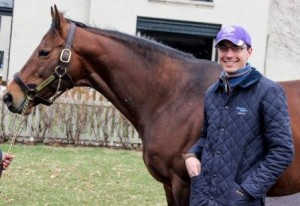
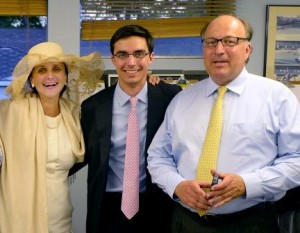
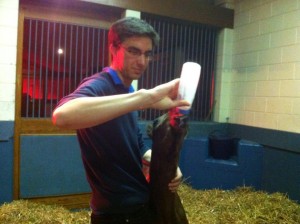
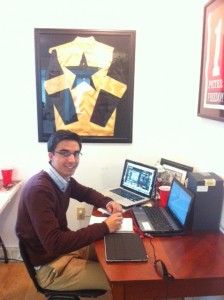
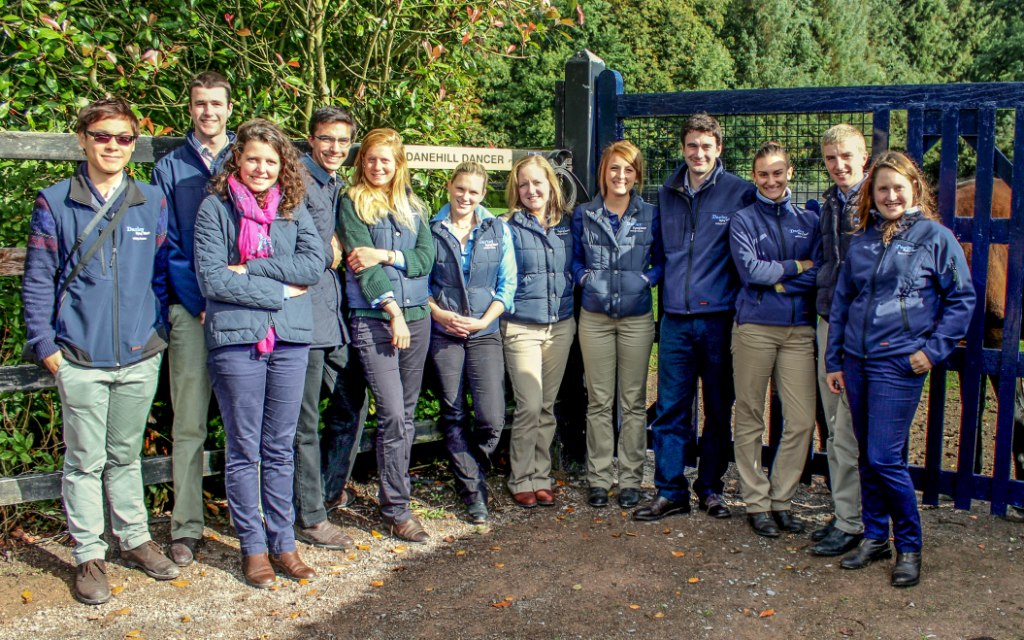
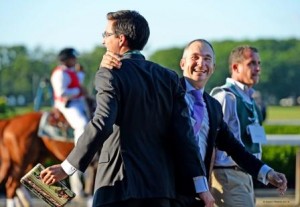
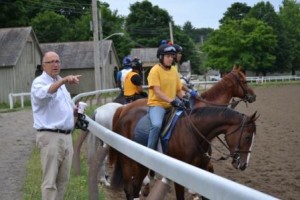
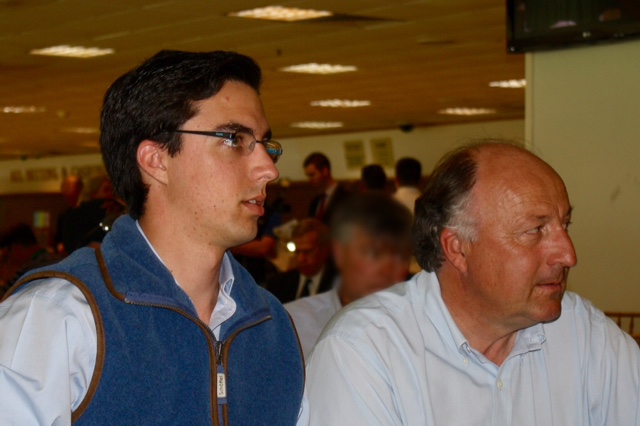
5 comments on “Meet Miguel Clement – Flying Start Trainee Odds On To Succeed”